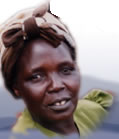 |
 |
||
 |
|||
|
RELATED THEMES conflict development history OTHER LOCAL THEMES BACKGROUND |
politics
During the colonial era, the Sabaot were ruled by non-Sabaot chiefs, and many feel that this was a "scheme...aimed at making Mount Elgon a Bukusu area". Several say that, although rivalry between the two communities goes back a long way, it was the colonial administration's favouring of the Bukusu which shaped the future political conflict between them. There are some vivid accounts of a Bukusu chief of that time who captured Sabaot men and "literally pulled out the dreadlocks that the Sabaot men of that age used to have". The aim was to force the Sabaot off their land, and the loss of property at that time is a cause of great resentment. Post-independence, not surprisingly, Sabaot and Bukusu ended up supporting different political parties, which added to the tension. The Sabaot were still administered locally by non-Sabaot leaders. One narrator said the fighting in 1963 with the Bukusu was caused not only by Sabaot frustration at being oppressed, but also because the Bukusu wanted one of their own to stand for Parliament in the Sabaot area. The Sabaot wanted Daniel Moss, who was one of them. Sabaot active involvement in the independence struggle was limited, not least because of their remote location. But the community contained supporters of Kenyatta, of whom several spoke favourably: "everything that we have right now in Mount Elgon certainly came during the Kenyatta era. All the schools we have were put up during that time" (Kenya 12) . Most narrators feel that the Moi government has ignored Sabaot interests, and that their situation has deteriorated. But they felt gratitude when they were granted "district" status in the early 90s - there is a sense that this administrative recognition marked true independence for the Sabaot. Nevertheless, a common theme is how the lack of highly educated Sabaot continues to seriously hamper their ability to represent their interests in the political arena: "The discrimination the Sabaot used to face at district level...has only been moved up to the provincial level...given that we only have one MP" (Kenya 11) . Several acknowledge that the problem is compounded by inadequate and corrupt local leaders, and lack of political unity within the Sabaot. quotes about politics"Leaders generally are also great liars. They tell the people that it is the government that has failed the Sabaot not them the leaders. But when you examine the whole thing critically, it is our leaders who have let us down because most of the time they are preoccupied with the squabbles among themselves." "We now have four divisions, which...show that the Sabaot are achieving their independence from the Bukusu. The Sabaot are somehow in charge of their own destiny." ".the misery that is in Elgon, is not because we don't have assets but is just because we don't have people to represent us in the government. " |
|
 Many male narrators talk about politics, but no women. Topics covered include Kenya's two presidents, Jomo Kenyatta and Daniel arap Moi, since independence in the early 60s, and how they have, or have not, helped the Sabaot; the independence movement; the performance of their elected councillors and MPs; and the significance of having gained their own district instead, of being administered from Bungoma. There is a strong feeling among narrators that the government ignores them, and their consistent political marginalisation is a major cause of the region's underdevelopment.
Many male narrators talk about politics, but no women. Topics covered include Kenya's two presidents, Jomo Kenyatta and Daniel arap Moi, since independence in the early 60s, and how they have, or have not, helped the Sabaot; the independence movement; the performance of their elected councillors and MPs; and the significance of having gained their own district instead, of being administered from Bungoma. There is a strong feeling among narrators that the government ignores them, and their consistent political marginalisation is a major cause of the region's underdevelopment.